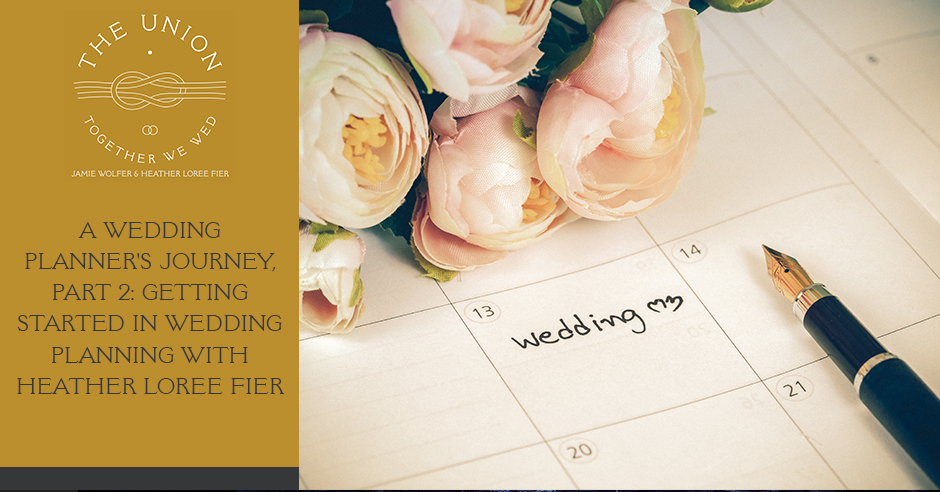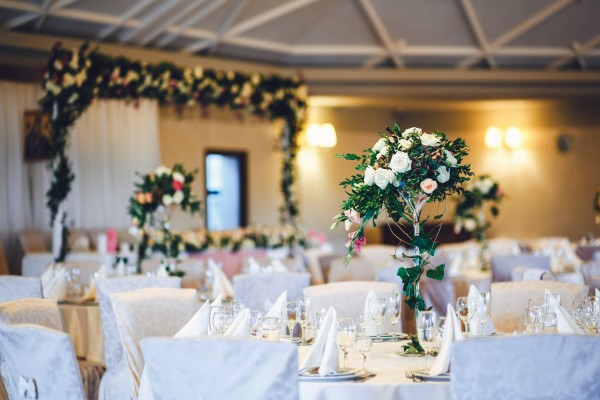
Becoming a wedding planner is not something that just happens overnight. It takes a lot of preparation, a specific taste, and a whole lot of networking to really be at the top of your game. Jamie Wolfer puts Heather Loree Fier in the hot seat to talk about her journey from planning events to becoming a wedding planner. Heather’s journey is an incredibly inspiring one with lots of lessons to take away, so make sure you don’t miss out!
—
Listen to the podcast here:
Important Links:
- Heather Loree Fier
- Facebook Group – The Union Podcast Community
- The Wedding Hacker
- Wedding Hacker Expo
- Generation Tux
- Roland Frasier
- Goal Digger Podcast
- The Wedding Hacker
- https://TheBudgetSavvyBride.com/directory/
About Heather Loree Fier

Heather Loree had a unique start to her career in the event space. In 2001, she began working in-store events and at special events at local natural food markets, fairs, and festivals in San Diego, CA with Natural Selection Promotions, Inc (NSP).
During her time at UCLA, Heather continued her exploration of marketing and event planning. She earned a position as the University Outreach Chair for Bruin Dance Marathon, volunteering her expertise and experience as an event, planning and marketing skills to help establish the event as a true university tradition.
For more than 15 years, Heather led the growth of NSP. By 2016, NSP developed a national reputation of success and orchestrated thousands of special events each month for clients coast to coast. Heather over saw the planning of more than 100,000 successful in-store special events for clients and store chains.
Heather loves giving back to her community and has served on the Board of Directors and event planning committees for local nonprofits, as well as being a licensed foster home through Angels Foster Family Network.
In 2018, she stepped back from her leadership role at NSP to follow her passions. Heather is now applying her event planning expertise supporting couples plan their weddings without breaking their budgets. She is a fierce believer that couples should plan their dream wedding without limiting their financial future.
Her first book, The Wedding Hacker: A Budget-Minded Planning Playbook, features tips, ticks and “hacks” for a gorgeous wedding on a budget.
A Wedding Planner’s Journey, Part 2: Getting Started In Wedding Planning With Heather Loree Fier
Heather: On this episode, I get to be the interviewee. Jamie is going to ask me some questions about how my business started, how it’s progressed and the unique way I’m running things now, which is virtual. Let’s dive on in.
—
Jamie: Let’s get excited. We have a special guest on the show. It’s Heather Loree Fier. We got a request over in our Facebook Group, which if you are not a part of, what are you doing? Get on over there. Join us on Facebook because we’d love to chat with you outside of this community as well or in that community. Someone specifically asked about how our business is, which is humbling and sweet. We decided that we would interview each other. In this episode, I’m going to be interviewing Heather on her business and how she got started. She’ll take us along that journey because this woman is a master at what she does.
Heather: I’m excited to share with everybody. I do things a little bit differently than the average person in this industry.
Jamie: A little bit? You single-handedly saved my keister before I launched The Master Plan. You are quite savvy in a lot of areas. I guarantee you our readers are going to learn a lot from you. Thank you for letting me interview you. When did you know that you want to do wedding planning?
Heather: I didn’t know so much that I wanted to do wedding planning specifically, but I knew I was a planner from the time I was small. I was known to have a lot of leadership potential at a young age. I came out ready to take charge of things. I was super organized and starting even as early as middle school. I was the first person to raise my hand to plan anything from a fundraiser to a dance. I took care of those streamers. I had them looking good way back then. I loved it and then it developed more towards weddings once I got into my adulthood years. I had a company before doing wedding stuff that was general event planning. As I got known for that within my friend’s circle, they all assumed, “Events, she can plan those, so why can’t she plan weddings?” Around my early twenties, I started having people be like, “Could you help with this wedding?” I’m like, “I guess. I don’t know specifics but I know how to plan an event so sure let’s give it a try.” My wedding happened and then things snowballed.
Jamie: Isn’t it funny when that happens where it’s dabbling in events, and then your wedding happens and you’re like, “Here we go?”
Heather: It was like that. That was exciting and fun to be helping people with their weddings early on. I wasn’t necessarily looking at it as a business. I was doing a lot of free stuff. I was your volunteer wedding planner, which is funny because it’s what I do now. I’m also a voluntary wedding planner. It comes full circle but I’ve monetized it in other ways. It works a lot better as a business. Back then, every friend would ask me and I was excited and I was like, “Weddings are fun. This is going to be great. Let me come over and spend twenty hours with you, helping you every detail.” I was a superstar friend, but looking back on it and I was like, “I should have been getting paid for that.” It wasn’t until those friends started referring their friends that I was like, “I’m going to probably charge people for this.” That’s when I would say it was a business.
Jamie: With all that, you talked about how you dipped your toes into the wedding world. How did you get your business started? What did that look like? You’ve got referrals and inquiries coming in from people you don’t know, but they know your past clients. How did you get started?
Heather: There was not a pre-planning. It had started some momentum from the referrals and I hadn’t even gotten a website up, business cards, and those things. I was in tandem and still had this other business. The other business is events in the marketing space specifically with natural foods. You wouldn’t think there were a lot of events there, but there were thousands of them everywhere. We worked with Whole Foods, Sprouts, Jimbo’s and Fresh Thyme Markets all across the country. That company was acquired in 2018. That was when I went to focus on weddings much later. For many years prior to that, I was coordinating weddings consistently for people all by word of mouth. There wasn’t a whole lot of setup at that point. I was taking referrals as they came and they were coming pretty consistently to my doorstep. That was amazing. It’s that word of mouth thing that I was doing a good job. People were impressed and they would send their friends.
Jamie: I never knew this. Whoever suggested this episode or this idea is genius. I didn’t know that you were doing weddings for so long before you even launched this as a business.
It's a lot of fun to help people with their weddings. Click To TweetHeather: I was doing them for a long time. At points in there, I thought, “Let me roll this out as a business. I would get a license and I’d get a name.” At one point I lived close to where Jamie lives and I had the website, Temecula Event Planner. I did that for a few years and then moved to a new area and then I was like, “I branded that a little too narrow because it’s suburb. I was like, “What am I doing? Should I go regional?” At different points, I went by my name and then I went by events I would care. I had a whole series of different things and I had done DBAs off the company that my husband and I own. It was this ebb and flow, and it wasn’t a consistent business, but the work was consistently getting sent to me. It was good timing because I feel like at my age in that bracket, many people were getting married and I had a big network of people.
Generally, I was friends with someone that knew the couple. I was not doing a whole lot of weddings for people who I fully was a total stranger to. It was a little bit unique. It was all network-based and it was crazy. I was running another company that was busy and doing this supplemental on the weekends, maybe most years around ten events, some years more, some years less. It was all over the place and then once that other companies sold, I was like, “I want to go into this. How do I want to build this business and what is the vision I have for it?”
Jamie: I’m learning so much about you. This is fascinating. What did that evolution look like then? Clearly, it was on the side, DBAs, different names and then it hit the ground running. What you do in your workday looks different than what a regular wedding planner does. Talk us through that evolution.
Heather: After the business that I had before this was sold, I was burnt out. That company got going to a pace that I had not been prepared for. I was flying across the country all the time running events that were tens of thousands of people attending them, which you wouldn’t think was weird for food marketing. It was a niche thing. It kept me busy and it exhausted me. When that went over to the new owners, I needed some time to decompress. Also, at that same time, my husband and I were fostering a baby. Life was crazy. We didn’t know if we were going to adopt her or not. It ended up where she went back with her mother, which has worked out beautifully for her. At that moment, when I was thinking where do I want to take this wedding business because I’d love to go toward that, I knew I wanted to focus on being a mom. I didn’t want to move towards a business that was going to be as time-consuming as I knew being a wedding planner full-time with a packed schedule would be. That’s where I started building something a little bit different.
Jamie: We have such a similar story in that wanting to be like, “I don’t have the time,” that a stereotypical wedding planner or people’s version or view of a wedding planner would have. “I don’t have the time, so how can I get creative by either taking on fewer events or getting creative with what I do with my time to make it successful?”
Heather: I knew I loved being at an event. I love coordinating events. It’s fun. The energy getting to be there with a couple and working with them through their planning process and seeing the day come together is special. I also knew that with a small child in my house, I did not want to be getting home at 2:00 AM, which what would happen often when I was running weddings. I started thinking about how I could position myself. What I looked back on with the experience I had is that most of the couples I worked with were middle class. Their weddings were not super high-end. Almost all of them were spending under $20,000. I realized that in this industry, I was working with people on slim budgets. To me, that seems like plenty of money. Throwing a party for $20,000 that’s something to bat an eyelash at. It’s a big deal to spend $20,000. For me, I didn’t even know that these were budget weddings, but suddenly I realized like, “This is my specialty at this point. How can I better serve these couples?” It was a price point where fitting a wedding planner or a coordinator into their budget was hard. I thought, “How can we lean in to something more digital?”
My husband is an online marketer, has his own podcast and all this tricky tech stuff he works with. I was like, “How can I do this with the wedding planning, merge this and make something unique and cool?” There were several iterations during the time when that foster daughter reunified with her mom. I was sad and devastated. I decided I’m going to write a book because I need something to distract me from the sadness that this baby left. Seriously, I spent four months every day writing a book, which I give away for free. It’s a brain dump of ideas all about different ways to save money. That process was a whole other thing I could talk about too about writing a book and the problems that you can run into there because things did not go as planned. They never go. There were some big stumbling blocks there. It is what it is and it’s out there. It’s helpful but I look at it and I’m like, “I want to make this better. There are many problems in this book that I do not like that it is how it is. I figured it’s helpful to people so I leave it out there as it is and give it away for free. It helps, that’s the point.
For me, it was a healing process to be putting all this creative energy and to be having this vision of helping many people. That’s where it went. That’s where I came up with The Wedding Hacker idea and angling towards this goal of helping couples who in this industry, don’t have a lot of access to reliable support or can’t afford the support. They think they can’t afford the support. I was coming up with solutions that would work for them. I ended up developing Wedding Hacker Expo after that, which was an idea to bring together resources and get some excitement about this idea to help these couples who get overlooked. From there, all these different things developed and it’s been exciting. It built out an online-based business that earns money in a way that you wouldn’t expect, which is the mystery behind The Wedding Hacker.
The crazy thing is it’s not uncommon for me to have a couple reach out, ask me questions and want support with their wedding, and I straight up give them free access to my stuff. Hopefully, this doesn’t upset people in this industry that I do that sometimes. If a couple reaches out to me and they’re like, “I have $2,000 to plan my wedding,” I don’t want to take $1 from them. I’m like, “You need every dollar to make this day special and I want you to have your special day.” All this stuff I’ve built like a habit for free and then nested into my course, there all these little Easter eggs of affiliate links. That’s where I make my money. This is disclosed to the people using my program that as you go through my program, you will see me recommend things like Generation Tux or Lillian Live Photography. I love these resources. I would not include a single thing in anything I do that I do not believe in. Those companies send me money for sending people to them. They’re also all resources that work well with people on slim budgets. It’s a win-win because the couple gets guidance and support.
I do monthly calls with these people. They’re invited to come in and ask me questions and get this support they would not find elsewhere that works with their budget. I’m getting cut in on this deal with money that they’re spending regardless. They’re going to hire a photographer so I’m going to get a little kickback. I make money, the couple is happy, the couple didn’t spend more, the photographer is happy because they’ve got work. Everybody is in a good spot and it’s opening the doors for a huge community to be helped and built up here. It’s been a wild ride to flip this industry on its head and offer these services. I do technically charge to join the club but it is not uncommon for me to do that, to give it away because I’m more motivated to help the couples. I know I can benefit financially in other ways from it. If they can’t pay me, they can’t pay me and it’s okay.

Becoming A Wedding Planner: It’s easy to find ways to monetize your services as a wedding planner so that you can make good business.
Jamie: Heather, you are a master at affiliate links. This is giving me inspiration because you’re such a wealth of information on this stuff. I’m like, “I’m going to write that.” I do think we should interview Joe.
Heather: We could try to get Joe here. He’d probably be open to it.
Jamie: That would be amazing. Especially because he has prowess and knowledge in this space. It’s been beneficial and helpful for you. Although, we all know that you would have done this whether or not you had a husband like Joe.
Heather: I wouldn’t on something. I don’t know if it would have quite been so tech-based because I push myself to the extremes with the tech stuff. As much as I give you tools and ideas and I know the things, me going through trying to set up a new shopping cart or something, it is frustrating at points. I also get to the moments where I’m like, “Why did I do a tech-based thing? What am I doing?” This is out of my comfort zone. It slowly got better and you learn and it becomes easier. That’s been my process with tech.
Jamie: Please take us through that process because you know that I was like, “Heather, what do I do with this? How does this work? What am I supposed to do with this?” You have been my guiding light through all of this digital space and it’s proven to be pretty successful for you. This is what you do now, which is crazy. If you would reflect back on all this time and all these incredible experiences that you’ve had growing this business, what would you say would be some of your biggest successes and your biggest challenges?
Heather: It’s a mixed bag. We’ve got all of those in there. My biggest success was The Wedding Hacker Expo. I did not know how well-received that event and how lucrative it would be in ways that I didn’t expect. Going into it, I see a lot of these online summits. This seems to be a trend. I thought, “Let’s change the word to Expo, switch some of the details out and make this a beneficial event for couples who are on a budget and want to tap into some awesome resources.” I put this together and I was thinking I was going to make money on the front end from couples who upgraded to premium access for the event. The sun will rise. There were surprises for me and down the road I found out sponsorships, “There’s some big money there.” I’ve found opportunities to co-reg, which means there are some big companies that will sponsor the event to have access to the email list. Ethically, I’m on the up and up about this. I disclose it to people as they sign up, but it’s always people who are going to benefit them and I feel are trustworthy. Finding those partners, they will throw some big money at these things. I was shocked at what I found. Putting that event together opened many doors. It was crazy.
On the flip side, that was a hard event to put together in a big stretch for my skillset. The challenges of getting it to look right, getting all the email campaigns to plugin properly, and to tag and keep everything on the rails afterward where I’m not sending people emails about the wrong things, it gets crazy. When there are tens of thousands of people in your email list, you’re like, “This is bananas. How am I going to go through and fix this if things get broken?” The biggest success was also the biggest challenge and they’re all in one. Pushing through those challenges, it’s made it something I’m proud of and excited that I get to share with the world now that event is out there in live.
I run it as an evergreen event. I do ads and I’ve been learning different ways to promote it, share it and bring in more people to enjoy. It’s a great lead magnet. It is a heavy-duty lead magnet as far as the amount of effort that went into it. It was probably a 4 to 6-month onboarding to get all of that content ready and get all the tech built-out. That was full focus of all of my time. This is not a little cheat sheet that a couple of days you cleaned it up and make it pretty. It’s crazy investment of time and energy. As far as what it’s helped my business do, it’s the main thing bringing people in. It’s been huge and I’m proud of it. It’s my baby.
Jamie: You should be. Heather, I’m bragging on you. You are such a wealth of knowledge. The way you’ve put this together is insane and masterful. You were good at this. We would not be here if it wasn’t for that expo. That’s how we met.
Heather: I remember reaching out to you being like, “This girl is cool.” I was like, “She knows so much about weddings. She is fun. Her personality is going to pop during this expo. It’s going to bring people in. I know it and I have to talk to her.” When I emailed you, I’m like, “No way. I’m never going to hear from her.” I couldn’t even believe it when I got to have you part of the event. It was quite a thrill. As soon as we chatted, we become friends during the interview.
You start out getting business from people in your immediate network. Click To TweetJamie: What you’ve built is something I admire. I know you say nice things about my channel. The word superstar has been tossed out there but truly what you do and how you’ve built it is something that we can all learn from. I look at you and I’m in awe and I’m like, “Can I ride your coattails?” Take me with you. I’ll be the funny sidekick. Let me know where you’re going and I will follow. It’s been an honor to be a part of that process and to watch the master work. I might have a lot of personality, but you know what you’re doing.
Heather: I get creative. My philosophy is, “It’s not a problem. It’s something you haven’t figured out yet.” With any situation, with the couples that I work, with the business, I never give up on it. That’s also something in my life that’s carried across in all aspects. I keep going, pushing and looking for a creative way to solve the problem because there’s always a way to solve it. It takes maybe stepping back and looking at things in a different frame or considering how you can bring together a few people who would benefit each other to position yourself in the middle where you benefit.
One person I respect and love to listen to in the business space is Roland Frasier. He is a master at this with business acquisition and things, which is long-term where I tend to go. Joe and I hope to invest in businesses and build things out to a grander scale aiming to help couples on a budget. With that in mind, I’m in awe of what he does. I look at it as like, “How can we get creative? How can we approach this in a way where it’s a win for everybody and target some people who don’t get the support and help that they need and are looking for something a little bit different than what this industry tends to provide?” That’s where I come from on my thought process.
Jamie: It’s something that you and I have stumbled upon that we find fascinating that there are business gurus out there teaching business guru-y stuff, email lists, affiliate links and how to grow your business. Little of it is transitioning to the wedding space. Both of you and I have seen that and we’re like, “Wait a minute.”
Heather: The wedding space is a little bit different and its own little island, but the reality is almost every business is the same at the core. You need your leads, convert them to sales, deliver your service or product, and ideally have them spread the word about how wonderful that process was to other people. Maybe you upsell them a little bit. These are the core things that every business does, no matter what they’re selling like bread or demos. I used to do sampling events or weddings, it doesn’t matter. It’s looking at those core aspects and transitions in the business as you move people down the conveyor belt, figuring out how to do a great job at each of those and apply it to your business. I love picking apart other people’s businesses, understanding what’s going on in their business, guiding them and helping them grow. For me, that plays into it too because it’s a fun game for me to solve these problems and to get creative.
Jamie: I’m not a huge podcast listener. My ears are typically required by small people in the house. I rarely have 35 to 55 minutes to spend with my brain invested in something else audio-wise. Someone is always doing something. We have to be listening. One that I listened to is Jenna Kutcher’s Goal Digger. She’s great and good. She talks about business growth and development and email lists. I went, “Why aren’t people doing this with the wedding industry?” I met you and I’m like, “Few people are, but this girl is doing it great.”
Heather: That’s what this industry needs because especially in this situation, you’re going to sink or you’re going to swim. You’re going to figure out a way to get creative to offer something different to support your clients better. Think of what a hero you are for your clients if you can get them through this time where they are overwhelmed and lost. Think of how strong those referrals are going to be that come out of this. I know it is slim pickings and tough times for people out there who are doing the traditional vendor route. Have that as your light at the end of the tunnel, that you are going to do an amazing exceptional job for the people you are working with. You are going to give them everything to make sure they feel supported, loved, and taken care of so that when they walk out of this and their wedding is phenomenal in a year or whenever, the day raises you to high heaven. That is powerful and that’s going to help your business be in a place that’s going to be long-lasting. That reputation is important.
Jamie: Good quality will bring you the good stuff. Give them your best stuff for free. Help them out as much as you can and great things will come of it. There’s power in word of mouth. I do have a question. How much money did you invest? Real talk in the beginning. Did you invest anything? How much was it? What’s that financial process? Some of our readers may be interested in breaking into wedding planning or the wedding industry.
Heather: Early on, not much was invested because this snowballed on me. Friends were the people that are hiring me and I wasn’t charging them. I didn’t invest a whole lot then. I bought a clipboard because I thought that would be cool. It even had a storage pocket in it? It’s fancy. That was early on and not a whole lot was happening there. Eventually, as I tried to put some branding out there and make a little more of a face for the company, I had a website built. I made Joe do that for me. I asked him and he was lovely and did that. I didn’t pay anything there except for the web domain, hosting and stuff, which is maybe $20 a year or something cheap. Where things got a little more expensive was when I got to the point where I was putting the website together. There were a lot more tech tools built in there. Building the expo out was rather expensive. Maybe about $8,000 to $10,000 went into it to build out all of the website, the editing for the videos, and content, because I had to produce on the backend of people, have the upgraded access, they get notes for every session, they get audio files. There was a lot of meat in that event and that cost a penny. A lot of it is tech-based stuff.
There was editing done to the book. Although if you read my book, you’re going to be like, “She did not get this edited.” I have a copy of that book in my desk highlighted all over the place of all the things I want to fix when I re-released it eventually. There was a sad story there that the editor I hired, she is incredible, but she was attacked and sexually assaulted in the middle of her time editing my book. I wasn’t going to backtrack and be like, “You’re the victim and you don’t get this job either.” I was like, “I cannot take this work away from this woman who had this freaking horrible thing happened to her.” I kept checking in and she was in the hospital, it was bad. She was like, “This is going to give me something to look forward to. I want to finish this and I want to do it.” I’m like, “I’m waiting.” Eventually, she gave it back to me months later and I had intended on already having it released. It is a traditional Heather to be overly excited and already start telling people. I had already started teasing it and being like, “It’s going to be ready,” and then it wasn’t ready.\

Becoming A Wedding Planner: Many couples planning their wedding don’t have access to reliable support because they can’t afford it.
She gave it back to me and was like, “I can’t mentally handle this.” I’m like, “Understandably.” I wasn’t trying to pressure her. I’m like, “Do it, don’t do it, whatever you want.” She gives it back to me halfway done. I was like, “This is the version of it that’s going to be out there.” That was a big fubar but still the content in there is good. It was a big lesson for me on project management and it broke my heart. It was a terrible thing to have her call me and tell me like, “This happened. This is why things are held up.” I’m like, “Take care of yourself. This isn’t fair or right.” Crazy weird things have happened in the process of doing this. That costs me some extra money because I paid her anyway and it didn’t get done properly. I had someone doing the formatting of the cover and you have to get it formatted particularly. It’s my self-published book. I’m not a published author by anyone else other than our own company.
Jamie: You’re a self-published author to me, Heather.
Heather: There are some errors in that book. I’m so embarrassed. The day that I was mailing books out, because I presold them, which is part of why I was like, “They’re going out like this.” I had to send it to the Library of Congress to be on file with a bunch of errors in it. I have the printed copies and I’m mailing them to the 100 people who pre-bought copies not many. This was right when I’m rolling all this The Wedding Hacker stuff out. Driving to the post office, I remember hearing a weird rattle in the back of my car and in my head I thought, “I hope that’s a grenade so it explodes and no one sees the books.” That’s what I thought to myself. I was petrified for anyone seeing this book that I was like, “I hope I explode in the air right now. I don’t know why there would be a grenade and I was that scared to have people see this. It was such a moment of being vulnerable to send this thing out that I knew wasn’t as good as I wanted it to be. It’s scary to work on something for months and months and people would read it and tell me this is the worst thing they’ve ever seen.
Jamie: I’ve never shared this with you, but my first awareness of who you were was because of that Facebook Group that we were both in together. You mentioned it and I was like, “I’ve got to scope this out. I’ve got to figure it out.” I was already thinking about my online course. I came at it from, “I’m going to see what she does.” I don’t think I’ve ever told you this. I looked at your book and I was like, “This is genius.” I didn’t read the whole thing.
Heather: That’s what I assumed. As I was mailing it out and I’m like, “Many errors are in this.”
Jamie: I didn’t see a single one. I was impressed by you and then you reached out to me for the expo and I was fangirling. I’m like, “This woman wrote a book, she’s running an expo and she wants to talk to me.” It is funny because you were experiencing that on the other end.
Heather: That’s proof for those of you who are trying to start a business, no one knows what they’re doing fully. We talk on here about ideas and things that are working, things that aren’t working, but all of us are pretending to be adults. We’re being kids. We’re doing the best we can with what we know. If you remember that, and it’s a lot less scary when you’re starting a new business or when you’re going after a big dream, that seems impossible because every single business you see in the world was started by some person who was crazy enough to try to do it.
Jamie: I know we have our list of questions, which I’m sure we’ve made feel organic that people don’t know we’re doing this. This makes me think, “What advice do you have for someone who wants to get started?”
Heather: You need to reflect on how do you want to serve this community because the traditional approach to this industry is you start and you maybe keep your prices low to get a bunch of experience. You raise your prices and move your way up to get into premium so you can live the dream life. What appeals to you about this? Are you someone who wants to do this full time? Are you trying to hit a financial goal or are you wanting to serve a certain population or work in weddings in a certain area? There are a lot of different angles and specialties. Think about what you want and maybe at first you don’t know. Get out there and test the waters. Be a little more general and then find what interests you and go towards that.
You’re going to have more success with a targeted niche than you are just being a wedding planner generally, “I’ll take any wedding. I’ll do a $200,000 wedding. I’ll do a $2,000 wedding.” You’re not going to be good at any of them. You’re doing a disservice to yourself and your clients. If you know you are going to be the best at this wedding, let’s say a beach wedding at $30,000 price point and that is your jam, do that. Get good at it and work with all the right people to do that well and grow your business right there. You will keep yourself busy because you will build out the right team of vendors who can refer people back to. You will find all those beachy people who are going to have their weddings at the beach and their friends will be beachy people. You’ll have your little beachy circle and it will be great.
If you think something is a problem, it’s not. It's just something you haven't figured out yet. Click To TweetJamie: That’s something that many people are afraid of pigeonholing themselves to be like, “I don’t want to be known as the beach wedding person because then, what if I lose clients?” What you don’t realize is you’re developing a brand. Everyone knows that you’re the beach wedding planner and they want to come to you. There is a fear and I felt that too of like, “I don’t want to be known as this.” I don’t know if I told you about a networking meeting that I went to where the speaker asked what demographic planners we’re working in, what budget range. She was like, “How many of you are in the $0 to $40,000 or maybe $50,000 range? How many planners?” I threw my hand up in the air. I was like, “That’s me. That’s my home. That’s my happy place. That’s what I know.” I looked around and no one else was raising their hands and I was mortified. After that she goes, “I’m glad you could own that.” My face was on fire. She’s like, “How about $60,000 to $75,000?” More hands show up and she goes, “What about $80,000 plus?” Even more hands go up. I’m like, “I admitted to a room full of wedding freaking professionals that I handle the cheap seats.” I was ashamed and I was embarrassed.
A vendor friend who was sitting next to me leans over and he goes, “That should be you raising your hand right here.” I thought, “No.” We go and we sit down to have dinner afterward and I’m embarrassed. My cheeks are on fire. I’m ashamed. I’m like, “Why did I admit that in a room full of professionals? Not only am I one of the youngest ones in here, even in my early 30s, I’m playing with the big dogs but now they all know.” Another vendor comes up to me. She works with a DJ Company and she goes, “Can I talk to you for a second?” I’m like, “Yeah, of course.” She goes, “I was embarrassed because all of these planners are holding their hands up for all these high budgets. We only have $25,000 and I felt ashamed.” I was like mic drop and threw off my napkin, “No, you were in the right place. You were doing the right thing.” Often, we think that putting herself in a hyper-specific niche is a bad idea. In a room full of wedding professionals, I was the only person she could talk to.
Heather: That exact situation that person was embarrassed by, that’s a huge part of the reason I angled my business the way I did because like you, I planned my wedding for around $8,000. I was laughed off the phone by people I called to get quotes from. It was hurtful. Luckily, I’m freaking strong, I was like, “I will show you this wedding is amazing.” I look at it like, “I’m going to plan a whole bunch of other weddings that are amazing at this price point.” It empowered me that the industry at large was a little judgy of the small budget. It made me feel like this isn’t right because realistically for most people, especially at this time, we can all agree that to drop in $50,000-plus on a wedding is a big spend. That is a premium spends. The average person in the US, I don’t even think they make $50,000, the average household. To think across the US your average household is less than the average wedding these people service, that’s outrageous.
Good for them. If you’ve got money to drop $200,000 at a wedding, amazing. Go and look for it. I hope I’m invited. I want to eat at that beautiful buffet or probably many phases of meals for that much money. I cannot wait. Would I plan a wedding for that? No. If I find me exceptionally wealthy someday, would I plan that wedding for my kids? Probably not. I would still be like, “Money should be used as a tool and let’s make a wonderful party that’s super fun for the people who were there without blowing all of our money on this because it’s not necessary.” To me, it isn’t the point of a wedding, but to other people it is and that’s okay. I hear you. You want to flash a little cash and show what you’ve got going. That’s good for you.
In my world, I am the proudest if I can brag about an amazing deal I got at the thrift store or a great pair of shoes, I got at Ross. That’s my vibe. If you don’t like that, I’m not the right wedding planner for you. A lot of people do like that. They find it helpful and validating that they have value in this industry even though they’re not hitting those price points. For me, it was a perfect thing that it was my personality. It’s what I’m interested in and I know how to do those weddings. For those looking for a tip, go towards what you know, what you’re comfortable with, and what you’re passionate about. If you hate the beach and you become the beach wedding lady, you’re going to hate your life and your job. Put that together. You plan weddings you enjoy being at, working at and in the areas you like being in those things. That would be my big tip for people. It will make your career more enjoyable. I can tell you that much.
Jamie: Heather, you are such a guru at this stuff because you’re right. What is it, 80% of couples plan their wedding without any wedding planner or coordinator whatsoever in the United States?
Heather: It’s about 70% go over budget and about 70% don’t have planners. I do think there might be a correlation there.
Jamie: You make a strong case. Also apparently, I’m exaggerating my percentages. Never believe in any numbers that come out of my mouth.
Heather: All these numbers that are reported in this industry are hard to know for sure. It’s not every year that they release average wedding costs, but they survey 14,000 people. There are 1 million to 2 million people get married a year. A lot of people get married a year, and so 14,000 is tiny. When I looked at the data, I would think it was about ten states. It didn’t even have anyone surveyed in the entire state. They didn’t even get one couple from some states. I’m like, “This data is not quite right.” The industry as a whole benefits these big companies to present that weddings cost a lot more than they do because then people feel embarrassed when they’re not spending that. They want to spend more, they feel pressure to spend more because they’re not even average. I empower my couples that like, “A lot of people are spending what you’re spending. You’re perfectly fine and you can see something amazing with what you have.” For me, that works. For some of you, you’re like, “This lady is crazy. I like planning $200,000-plus weddings because it’s fun.” I’m sure it is. That sounds fun but this is what I know and I have a heart for these people, so that I like to do.
Jamie: This has been one of my favorite episodes. It’s been fascinating. I want to end this and be like, “Tell me more. I have more questions. I have more follow-up stuff.” Thanks for sharing that journey with us. Your passion for your niche is inspiring. I want to be like you when I grow up.

Becoming A Wedding Planner: The wedding space is a little bit different and it exists in its own little island, but the reality is almost every business is the same at the core.
Heather: You already are.
Jamie: Thank you for indulging me and the readers a little bit, so we could know more of your heart and how you did what you did. We can all go and try to be as cool as you are. They may not be wearing blue lipstick, but they could try.
Heather: They could try. It’s hard to pull off. Thank you for having me on your fancy show and I hope you enjoyed.
Love the show? Subscribe, rate, review, and share!
Join The Union Podcast community today:






